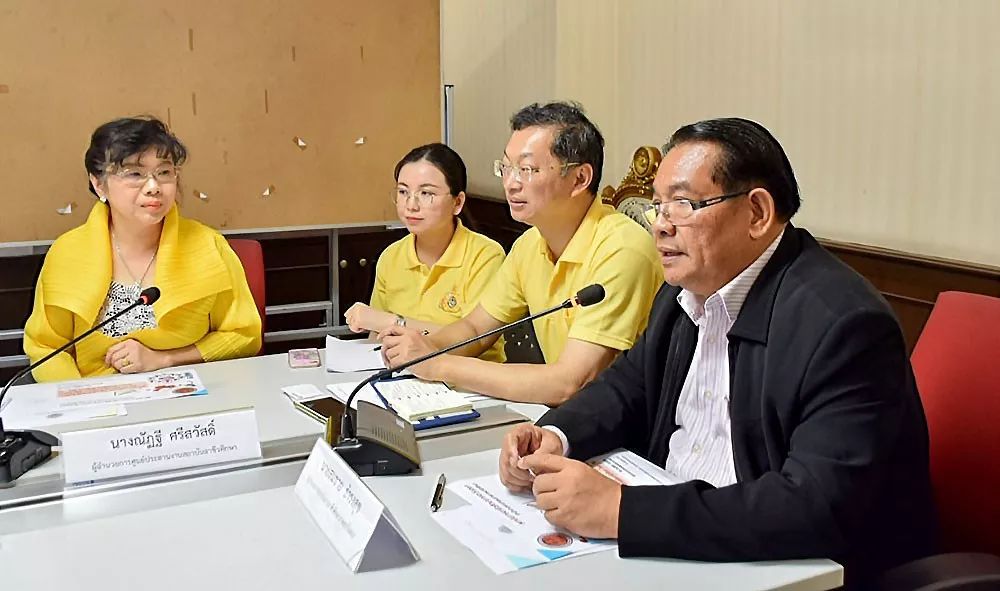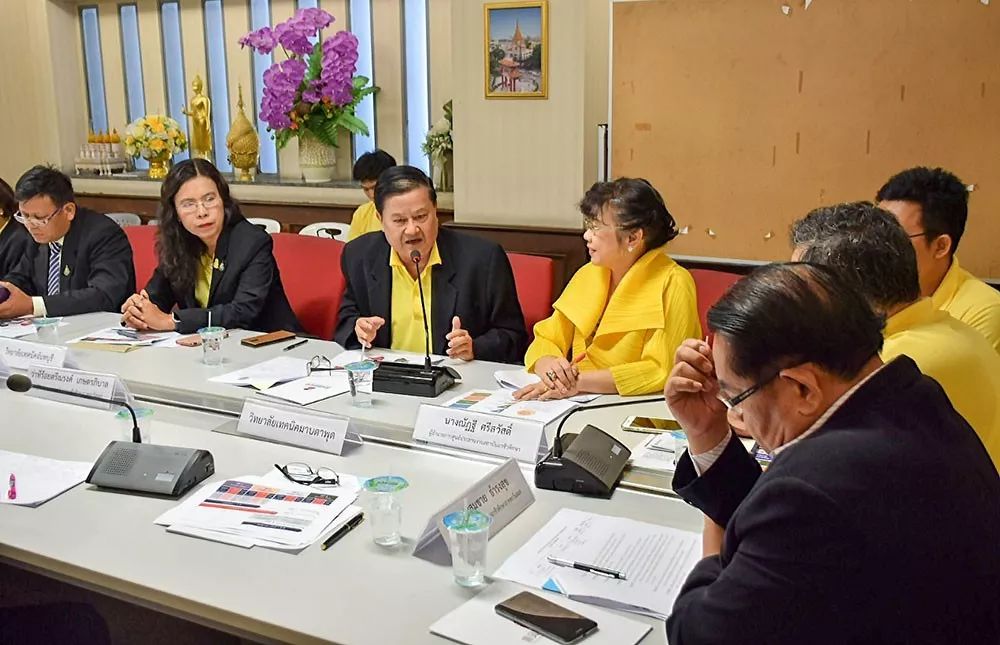The Cooperation Seminar was Successfully Held in the Golden Buddha Temple and Reached a Consensus on Cooperation
On July 26th, 2019, a seminar of CCTE model cooperation of vocational education centers in eastern and central Thailand which organized by Tang and Thailand Vocational Education Commission was held in Golden Buddha Temple. Deputy monk Wang Songde, (Chairman of Thailand's Longcai Foundation), Mr. Li Jinsong (President of Tang), Mr. Boonsong Champabhoti (Special Adviser of Thailand's State Council Office), Ms. NudtheeSrisawat (Director of Thailand's Vocational Education Commission Coordination Office), Mr. Somchai Tamrongsuk (Director of the Eastern Vocational Education Center), and Mr. Chai Sirisomsakul (Director of the Central First District Vocational Education Center), have led the principals of 19 vocational colleges under their jurisdiction to attend the meeting.

At the meeting, President Li Jinsong introduced to the guests about Tang's efforts and achievements in the "Internet+" education, and he highlighted the achievements made in running a school in cooperation with Bangkok Vocational Education Center on "Internet +" under the CCTE mode. At present, 11 of its 13 vocational colleges have cooperation with China's excellent vocational colleges. With the support of Tang information platform, colleges and universities of the two countries have made great efforts to train international talents in logistics, rail transit, industrial robots, IT, Unmanned Aerial Vehicle, jewelry design and other specialties. In addition, dozens of colleges and universities in Thailand, such as the North District 2, the South District 3, the Central District 3, and the Northern Agricultural Vocational Education Center, have also carried out the "Internet +" dual-education cooperation under the CCTE model. President Li said that the Eastern Vocational Education Center is the practice base of (EEC) policy in the Eastern Economic Corridor of Thailand. Tang is willing to help eastern vocational colleges quickly embark on the road of intelligent international education, realize the specialization, localization and informationization of vocational education in China and Thailand under the CCTE model, contribute to the economic development of eastern Thailand, and is also willing to work with more institutions such as the first District in Central Thailand.

Mr Somchai Tamrongsuk(director of the eastern vocational education center), he pointed out that a large number of high-quality and high-tech Chinese enterprises have invested in Thailand and gathered in the eastern region. Therefore, the development of the eastern special economic zone in Thailand urgently needs high-quality professional who master Chinese and high technical to join this development. At present, the Chinese education in vocational colleges of eastern region needs to be specification and standardization, and the eastern region is shortage of professional talents to meet the needs of enterprises. Therefore, Tang's "Internet +" Chinese learning platform can provide norms for the chinese development of Thailand east part’s vocational schools, especially the CCTE model (Chinese + culture + skills + employment) advocated by Tang is a good way to cultivate comprehensive applied talents.

Mr. Chai Sirisomsakul(Director of the first District of Central Thailand’s Vocational Education Center)said that the CCTE model proposed by Tang meets the needs of the development of vocational colleges in Thailand. He is very grateful to Mr. Li Jinsong for creating such an education program for Thai students which help them develop in an all-round way and improve their employment.

On the afternoon of the 26th, Master Songde Tongchai attended and listened to the reports of President Li and Thai representatives. He affirmed and encouraged the efforts made by all parties for the development of Thailand's vocational education and the idea of being courageous and innovative. At the same time, the Master gave important instructions: "the eastern economic zone is the top priority of Thailand's economic development, so the EEC will drive the economic development of Thailand as a whole, and we all have the responsibility to train outstanding professionals for Thailand. Tang has made important contributions to China-Thailand educational’s cooperation and exchanges, especially providing solutions for modern educational technology products, and innovating the CCTE China-Thailand educational cooperation model. The CCTE model is worthy of study and practice in various vocational colleges in order to train talent persons who willing to learn the language, have highly skills, understand corporate’s culture and meet the needs of enterprises, those persons are an important force in promoting for the development. While paying attention to train the students, we should also pay attention to train and reserve for the professional teachers. The teachers are in a line with international standards, which can benefit the students’ education.”At the same time, all parties should strengthen the cooperation and strive to build standardized vocational education courses. And take an importance for overall education’s quality. " Finally, the Master invited everyone to participate the first "Chinese Bridge" Jewelry King Cup’s Professional Chinese Education Competition which to be held in this year September, and encouraging vocational school students to participate this competition to show their elegant of learning Chinese.

Under the guidance of Master Songde Tongchai, each leaders of vocational colleges and Tang reached a consensus on the cooperation between China and Thailand under the CCTE model’s "Internet +". And he plans to organize a delegation to visit China's outstanding vocational colleges in this year October to reach a relevant international educational’s cooperation and implement the new model for China-Thailand educational cooperation which supported by new technological, these is for China's Belt and Road Initiative, Thailand's 4.0 Plan, and EEC's Eastern Economic Corridor Plan to train international professionals to adapt the development for the two countries

